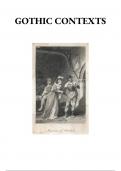GOTHIC CONTEXTS
, Eighteenth-Century Origins
Walpole, The Castle of Otranto (1764 edition)
William Beckford, Vathek (1786)
Ann Radcliffe,The Mysteries of Udolpho (1794)
Matthew Lewis, The Monk (1796)
Ann Radcliffe, The Italian (1797)
From ‘The Castle of Otranto’ by Horace Walpole (1764)
Manfred, Prince of Otranto, had one son and one daughter: the latter, a most
beautiful virgin, aged eighteen, was called Matilda. Conrad, the son, was three years
younger, a homely youth, sickly, and of no promising disposition; yet he was the darling of
his father, who never showed any symptoms of affection to Matilda. Manfred had contracted
a marriage for his son with the Marquis of Vicenza’s daughter, Isabella; and she had already
been delivered by her guardians into the hands of Manfred, that he might celebrate the
wedding as soon as Conrad’s infirm state of health would permit.
Manfred’s impatience for this ceremonial was remarked by his family and neighbours.
The former, indeed, apprehending the severity of their Prince’s disposition, did not dare to
utter their surmises on this precipitation. Hippolita, his wife, an amiable lady, did sometimes
venture to represent the danger of marrying their only son so early, considering his great
youth, and greater infirmities; but she never received any other answer than reflections on
her own sterility, who had given him but one heir. His tenants and subjects were less
cautious in their discourses. They attributed this hasty wedding to the Prince’s dread of
seeing accomplished an ancient prophecy, which was said to have pronounced that the
castle and lordship of Otranto “should pass from the present family, whenever the real owner
should be grown too large to inhabit it.” It was difficult to make any sense of this prophecy;
and still less easy to conceive what it had to do with the marriage in question. Yet these
mysteries, or contradictions, did not make the populace adhere the less to their opinion.
Young Conrad’s birthday was fixed for his espousals. The company was assembled
in the chapel of the Castle, and everything ready for beginning the divine office, when
Conrad himself was missing. Manfred, impatient of the least delay, and who had not
observed his son retire, despatched one of his attendants to summon the young Prince. The
servant, who had not stayed long enough to have crossed the court to Conrad’s apartment,
came running back breathless, in a frantic manner, his eyes staring, and foaming at the
mouth. He said nothing, but pointed to the court.
The company were struck with terror and amazement. The Princess Hippolita,
without knowing what was the matter, but anxious for her son, swooned away. Manfred, less
apprehensive than enraged at the procrastination of the nuptials, and at the folly of his
domestic, asked imperiously what was the matter? The fellow made no answer, but
continued pointing towards the courtyard; and at last, after repeated questions put to him,
cried out, “Oh! the helmet! the helmet!”
In the meantime, some of the company had run into the court, from whence was
heard a confused noise of shrieks, horror, and surprise. Manfred, who began to be alarmed
at not seeing his son, went himself to get information of what occasioned this strange
confusion. Matilda remained endeavouring to assist her mother, and Isabella stayed for the
same purpose, and to avoid showing any impatience for the bridegroom, for whom, in truth,
she had conceived little affection.




